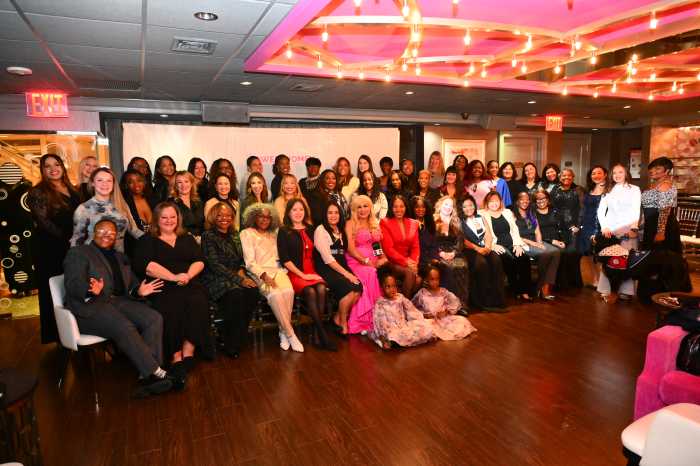By Arlene McKanic
The cabaret theater on the lower level of Queens Theatre in the Park is a nondescript joint with little tables and ugly chairs. Every table came with a basket of pretzels Friday night and a menu card for drinks. The clientele was mostly older folks who sipped their wine through straws from plastic cups.
But looks were deceiving.
Sam Rossi’s show, ‘“60s Men of Emotion,” was sensational. Rossi, singing in a high tenor that could dip down effortlessly into the bass range for emotional effect, showcased the mushier numbers that were popularized during the ‘60s by such loungey luminaries as Gene Pitney, who seems to be Rossi’s all time fave, Roy Orbison, the Righteous Brothers, Steve Lawrence, and others. The songs were almost all sad.
“It’s an afternoon to sit back and wallow in self pity,” said Rossi, who in his day job serves as the theater’s director of communications. “If you happen to be with someone now, think of it as a preview.”
He started off, of course, with “Love Hurts,” accompanied by his musical director Wells Hanley on piano, and went on to such classics as Johnny Ray’s “Cry,” a ‘50s song, but it served. He followed that with Orbison’s “Mean Woman Blues,” and “Cry,” though Rossi crooned the tunes without Roy’s falsetto embellishments.
He transformed both Lennon/McCartney’s (or is it McCartney/Lennon nowadays?) bouncy “Help,” and the first few bars of “Eight Days a Week,” into weepies, though “Help’s” lyrics, written by John during what he called his “Fat Elvis,” period, are pretty lugubrious. Rossi changed the gender of the subject in the dreadfully pathetic “Honey,” made infamous by Bobby Goldboro, and so turned the song into a killer for the age of AIDS; you could hear a pin drop in the house. He then leapt into “Blame It On the Bossa Nova,” (“Now, that’s a lounge song!” I thought) but returned quickly to the sad stuff. He closed the first part of the act with “You’ve Lost That Lovin’ Feelin’,” “I’m Gonna Be Strong,” and “Looking Through the Eyes of Love,” all three by Barry Mann and Cynthia Weil, who wrote hundreds of such songs.
The second act brought a slight change of tone. Rossi started off with banter about his life — he was born and raised on the same Maine street as Jazz Age entertainer Rudy Vallee — and then performed three rather sardonic little numbers that could have been (but weren’t) written by Sondheim: “Backstage (I’m Lonely),” by Anisfield-Denson and “Alone” and “Jackie,” by Jacques Brel. He followed them with three sorrowing Randy Newman songs, accompanied by the Two Willies on Spanish guitar.
Rossi ended the evening with more songs by Gene Pitney: “Tower Tall,” “Take It Like a Man,” “Town Without Pity,” and the Hal David, Burt Bacharach number, “Only Love Can Break a Heart.” But the show wasn’t over until Rossi sang “All the Way.”
Suzanne Lavender did the wonderful lighting design, which kept Rossi in a tight spotlight most of the time, and shifted fluidly between numbers; the execution was by Bill Anderson. Gerry Geddes directed.
Rossi has had a long career of playing in theater, including both Judas and Jesus in “Jesus Christ Superstar.” “‘60s Men of Emotion” was his Queens debut as a cabaret performer. Judging from his performance last Sunday, he will have a long and fruitful career in this, as well.



































